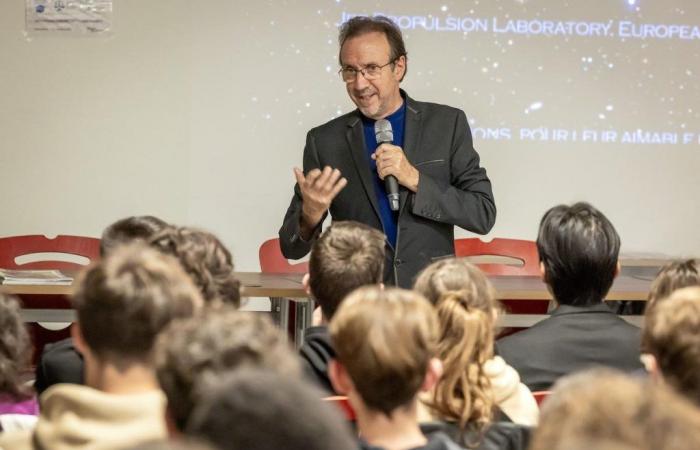The son of the famous astrophysicist Hubert Reeves, who knows the solar system like the back of his hand, gave a lecture, followed by an exchange with the general first year students organized by the establishment’s physics, chemistry and SVT teachers.
The disappearance of humanity, an anecdote on a universal scale
“Thanks to the data provided by the James Webb space telescope, prodigious discoveries are made very regularly in astrophysics, which we should not hesitate to disseminate to the general public, and particularly young people. This is what my father was trying to do,” recalls the speaker (Editor’s note: Hubert Reeves died on October 13, 2023).
Black holes, gravitational waves, exoplanets. Charline is passionate about the discipline and is already familiar with most astrophysics concepts. “I want to become an aerospace engineer. It’s fascinating to see that the molecules that make us up are the same ones that make up the celestial bodies,” she notes.
“If we can make young people want to look up to the sky from time to time, that’s good.”
“If man were to disappear, it would only be an anecdote on the scale of universal life,” emphasizes Benoît Reeves. And precisely, it is also ecology and preservation of the planet that was discussed. A subject that interests Pierre, a high school student. “Personally, I am rather pessimistic. I think we will not be able to adapt to the end of oil. And electrical energy will not allow us to maintain our current standard of living.”
Benoît Reeves, a specialist in these issues, who is also an orchestra director, refuses to play the symphony of the end of the world. “The future is not written. What we do know is that 82% of our planet’s lifespan has already passed. In a billion years, the sun’s temperature will make Earth uninhabitable. But until then, nothing prevents us from asking ourselves what we want to do with our planet,” he breathes, before submitting to the high school students this philosophical question: “In your opinion, is intelligence harmful? to the preservation of life on Earth? “.
To end this day, the students were invited by the scientist to observe the stars in the evening at the Eaux Claires valley in Puymoyen. “Young people today have a higher level of thinking than their level of communication. But they are too focused on consumption. If we can make them want to look up to the sky from time to time, that’s good.”






